- Last Updated: February 16th, 2026
Key Takeaways
Social media harm lawsuit statutes provide the legal framework for plaintiffs to seek compensation for psychological and emotional harm caused by social media addiction and usage.
Understanding the statute of limitations is crucial for timely filing social media harm lawsuits, as failing to act within the specified period can result in losing the right to sue.
Consulting experienced social media harm attorneys is essential to protecting victims' rights, navigating complex legal requirements, and ensuring prompt legal action within the applicable statute of limitations.
Overview of Social Media Harm Lawsuit Statute
On this page, we’ll discuss an overview of the social media harm lawsuit statute, their impact on social media addiction lawsuits, how to file a social media harm lawsuit, and much more.
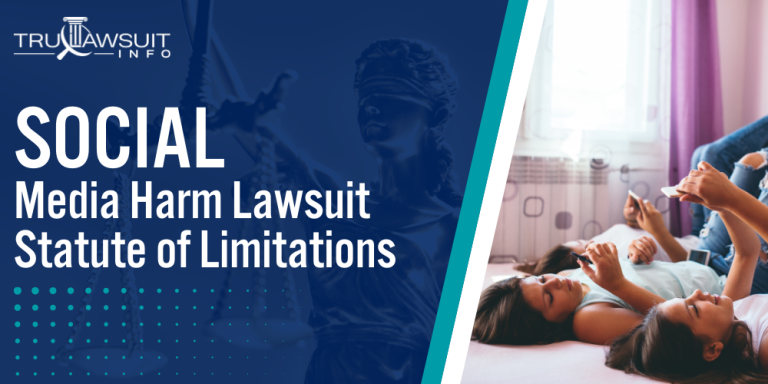
Intro to Social Media Harm Lawsuit Statute
Some of the key aspects of the Social Media Harm Lawsuit Statute include, but are not limited to:
- Cause of Action: The statute provides a legal cause of action for individuals who have suffered harm due to the use of social media platforms.
- Liability: It establishes the basis for holding social media companies liable for the harms caused by their platforms.
- Damages: The statute outlines the types of damages that plaintiffs can seek, such as compensatory and punitive damages.
- Statute of Limitations: It specifies the time period within which a social media harm lawsuit must be filed.
If you believe that you have a case under the Social Media Harm Lawsuit Statute, it’s important to consult with an experienced attorney to understand your legal options.
Contact Tru Lawsuit Info today using the chat on this page to receive an instant case evaluation.
Understanding the Statute of Limitations
Before diving into the intricacies of the statute of limitations, it’s essential to grasp that this legal mechanism serves as a stopwatch for filing lawsuits—a countdown that, once expired, can bar claims forever, especially relevant in the context of social media lawsuits.
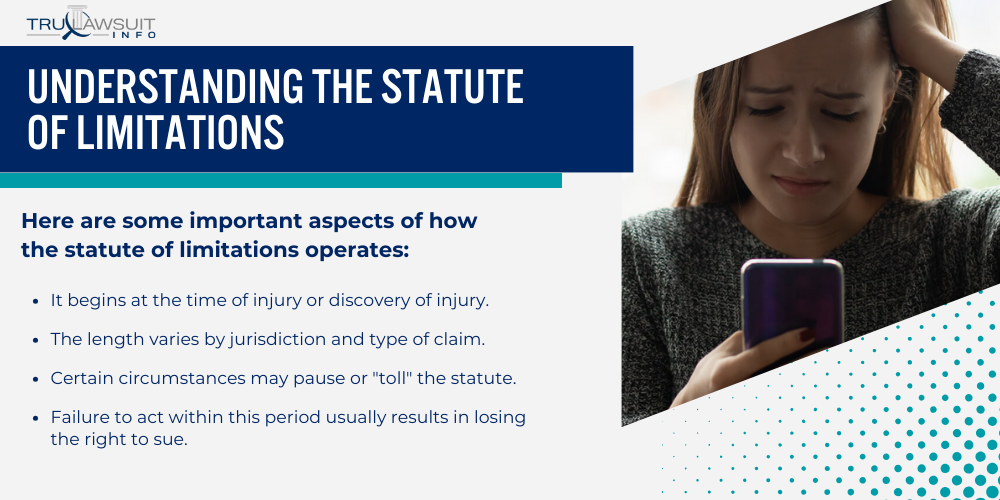
Definition of Statute of Limitations in Legal Context
The statute of limitations describes the maximum time after an event within which legal proceedings may be initiated.
When applied to social media addiction lawsuits or similar cases, this period dictates how long an individual has to commence legal action after experiencing harm.
Here are some important aspects of how the statute of limitations operates:
- It begins at the time of injury or discovery of injury.
- The length varies by jurisdiction and type of claim.
- Certain circumstances may pause or “toll” the statute.
- Failure to act within this period usually results in losing the right to sue.
The legal statutes are put in place to ensure that cases are resolved while evidence is still fresh and to promote resolution within a reasonable timeframe.
Importance of Timely Filing Social Media Harm Lawsuits
Timely filing in the case of a social media harm lawsuit cannot be overstated.
Legislative time limits are not just a formality; they serve a pivotal function in the judicial system by promoting justice and efficiency.
Here are several key reasons why adhering to these time limits is crucial:
- Respects the integrity of evidence as memories fade and records are lost over time.
- Provides closure for all parties involved.
- Encourages prompt action which can be crucial for a successful outcome.
- Avoids the undue hardship that might result from an unexpectedly resurrected claim.
Potential plaintiffs must understand this information about social media litigation to ensure they pursue their cases in a timely manner.
Factors Affecting the Statute of Limitations
The timeframe within which one can initiate a social media harm lawsuit depends heavily on several elements.
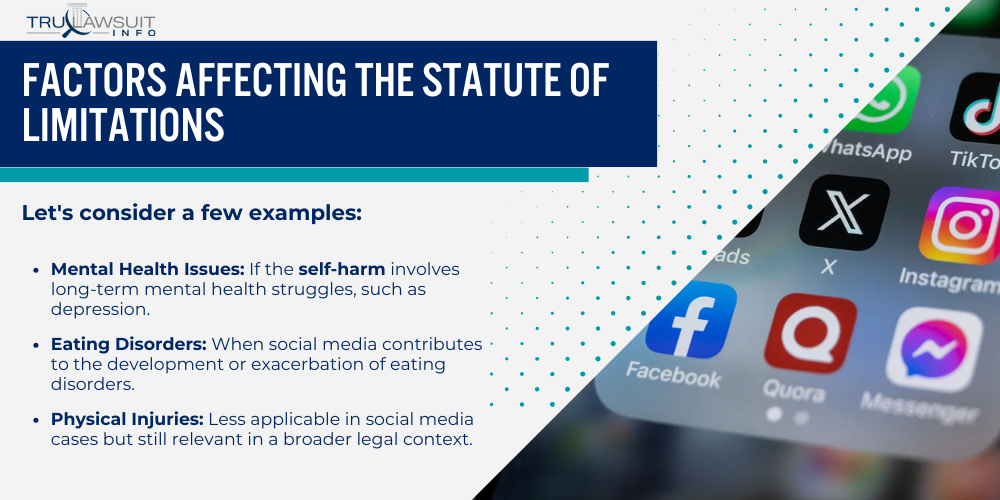
These elements set the stage for whether a claim can proceed or must be dismissed due to the legal time limits imposed.
Type and Severity of Harm Suffered
Factors including the type and severity of harm experienced by social media users play a pivotal role in the statute of limitations.
Let’s consider a few examples:
- Mental Health Issues: If the self-harm involves long-term mental health struggles, such as depression or anxiety caused by excessive social media use, the time to sue may be longer.
- Eating Disorders: When social media contributes to the development or exacerbation of eating disorders, this serious health consequence can influence the statute of limitations.
- Physical Injuries: Less applicable in social media cases but still relevant in a broader legal context.
- Financial Loss: Quantifiable financial harm may prompt a different statute of limitations compared to non-economic damages.
Jurisdiction and Applicable State Laws
The jurisdiction and the state laws where the social media addiction lawsuit is filed are decisive factors in the statute of limitations.
Each state possesses its own legal framework that dictates the permitted duration for filing a lawsuit.
Consider the following key elements that influence the statute of limitations across different states:
- State Statutes: They clearly define the allowable time period for different kinds of lawsuits, which may vary notably from one state to another.
- Precedent: Prior court decisions within the jurisdiction can affect interpretations of time limits.
- Legislation Updates: Changes in the law can reset or alter the duration available to sue.
- Tolling Provisions: Some circumstances, such as the plaintiff being a minor, can pause or extend the statute of limitations.
Discovering Harm and the Start of the Limitation Period
In social media harm lawsuits, the issue of when an individual first became aware of the harm and the start of the limitation period are critical elements to consider.
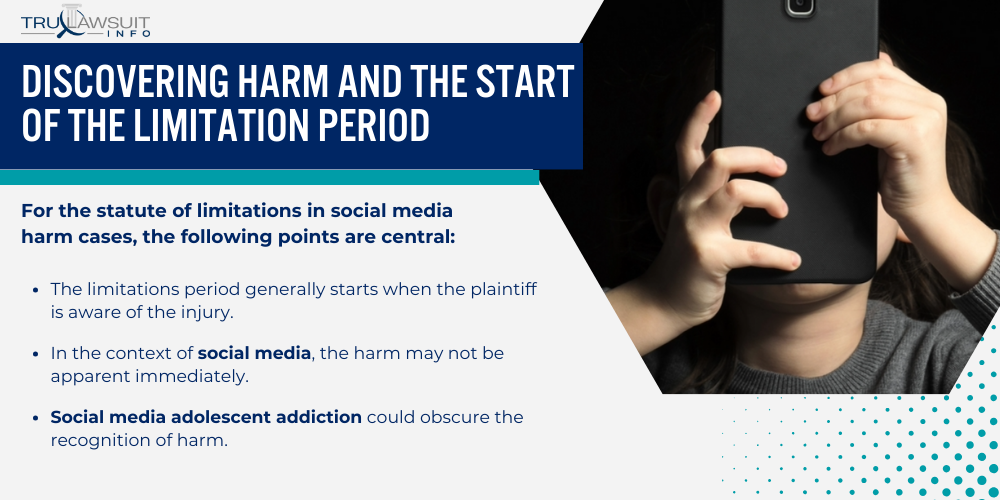
When the Clock Starts Ticking on Social Media Harm Claims
The commencement of the statute of limitations for social media harm claims hinges on when the harm is first discovered or reasonably should have been discovered.
Young users and young adults might not immediately recognize the negative impact of their social media accounts.
The timeline for when legal action must be initiated could vary.
For the statute of limitations in social media harm cases, the following points are central:
- The limitations period generally starts when the plaintiff is aware of the injury.
- In the context of social media, the harm may not be apparent immediately.
- Social media adolescent addiction could obscure the recognition of harm.
- Proving the date of discovery can be critical for young plaintiffs to maintain a claim within the statute limitations.
The specific timing can be challenging to determine, as harm from social media can be insidious and cumulative over time.
The Discovery Rule and Its Application to Social Media Cases
The discovery rule, a legal principle often applied in tort law, becomes particularly significant in the realm of social media.
As users engage with various platforms, they may not immediately realize the harm incurred, ranging from privacy breaches to psychological impacts.
The discovery rule is applied to social media cases in the following manner:
- It allows the statute of limitations to begin at the point of discovery of harm rather than the date of the event.
- For many young people, acknowledging the psychological impact of social media harm may come later.
- Legal precedent suggests that the delay in discovering harm in social media cases can influence when the limitation period starts.
- Courts may face the task of determining when a reasonable person should have recognized the harm.
In essence, the discovery rule acknowledges that the harm caused by social media may not always be immediately evident, especially when young users are involved.
It provides a legal basis for extending the initiation of claims beyond the typical limitation period.
Tolling the Statute of Limitations
The statute of limitations provides a deadline for individuals to initiate legal proceedings.
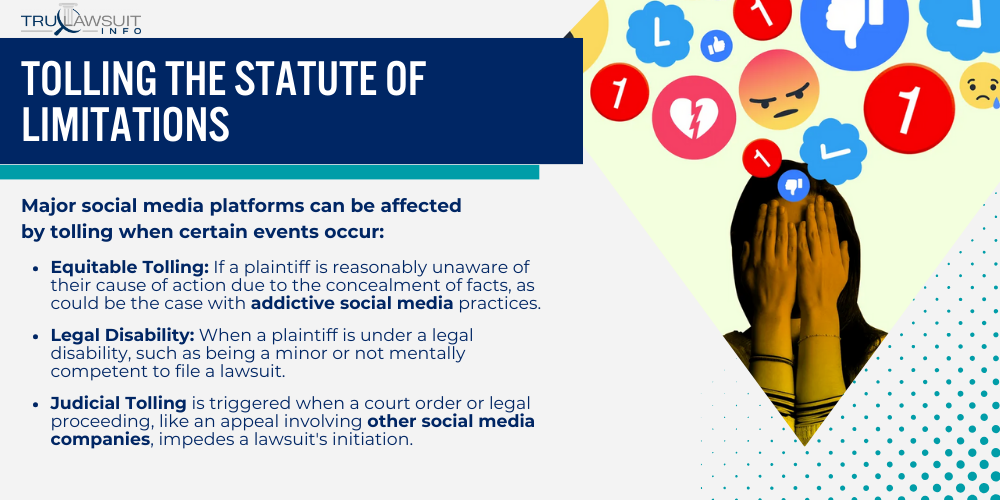
In the context of Social Media Harm Lawsuits, certain conditions can suspend or extend this critical timeframe.
Circumstances That May Pause the Limitation Period
Tolling refers to the legal mechanism that pauses the statute of limitations.
Major social media platforms can be affected by tolling when certain events occur:
- Equitable Tolling: If a plaintiff is reasonably unaware of their cause of action due to the concealment of facts, as could be the case with addictive social media practices.
- Legal Disability: When a plaintiff is under a legal disability, such as being a minor or not mentally competent to file a lawsuit.
- Judicial Tolling is triggered when a court order or legal proceeding, like an appeal involving other social media companies, impedes a lawsuit’s initiation.
- Legislative Actions: Laws or executive orders, potentially in response to public health emergencies, could halt limitations periods for individuals filing claims against social media entities.
Minority, Mental Incapacity, and Other Tolling Factors
Legal exceptions, such as minority status, mental incapacity, and other conditions, can significantly impact the commencement of legal action by delaying the start of the limitation period.
These tolling factors are crucial in ensuring that individuals who are temporarily unable to bring a lawsuit are not unjustly barred from seeking redress due to the passage of time.
Tolling can particularly apply to those who are legally incapable of initiating a claim:
- Minor Status: Individuals under the age of majority can have their limitation period tolled until they reach the age where they can legally file a suit.
- Mental Incapacity: If a person is deemed mentally unfit to pursue a case, the statute of limitations might be tolled until they are restored to capacity.
- Discovery Rule: Sometimes, the harm inflicted by major social media companies on young people may not be immediately apparent, in which case the limitation period begins when the harm is or should have been discovered.
- Class Actions: When a person is a member of a class action lawsuit against social media platforms, the statute of limitations can be tolled for all members until the class certification is decided.
This legal landscape influences how lawsuits against social media companies—focused on issues like the Communications Decency Act and claims of social media harm—are navigated and processed through the legal system.
Navigating Multi-Jurisdictional Cases
When taking legal action for social media harm cases with multi-jurisdictional elements, one must consider the appropriate place to file the lawsuit and the applicable statute of limitations.
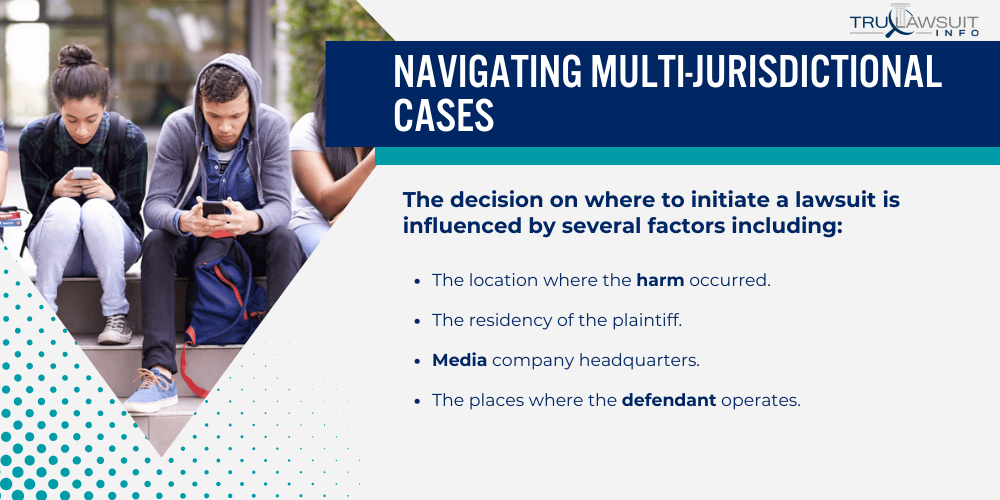
These decisions can impact the success of a case, especially where mental health issues and the desire to seek justice are involved.
Determining the Appropriate Jurisdiction for Filing
Choosing the right jurisdiction to file a lawsuit requires careful consideration of where the harm has had its impact and the connections of both the plaintiff and the defendant to potential venues.
This decision is crucial as it can affect the legal strategies available and the overall outcome of the case.
The decision on where to initiate a lawsuit is influenced by several factors including:
- The location where the harm occurred.
- The residency of the plaintiff.
- Media company headquarters.
- The places where the defendant operates.
It is essential to evaluate each jurisdiction’s policies regarding mental health effects and online harm to determine the most advantageous forum for the case.
Applying the Most Favorable Statute of Limitations
Each state may have different deadlines to file a lawsuit, often called the statute of limitations.
Critical steps to identify the most favorable statute include:
- Examining the statutes of all potential jurisdictions.
- Identifying any exceptions for delayed discovery of harm, which is particularly relevant to mental health issues and their latent manifestations.
- Considering whether the harm is ongoing, which may affect the starting point for the limitations period.
- Evaluating the possibility of tolling, or pausing, the statute of limitations, which could be particularly pertinent in cases of suicidal ideation or physical harm.
Selecting the correct jurisdiction and statute of limitations is a fundamental part of building a solid case in a social media harm lawsuit.
It requires careful consideration of how to protect the rights of those affected and to seek justice effectively in cases that are inherently challenging due to their multifaceted nature.
Consulting with Legal Professionals
When pursuing legal recourse for harm caused by social media, individuals need to seek the counsel of skilled attorneys who have a deep understanding of the specific legal landscape.
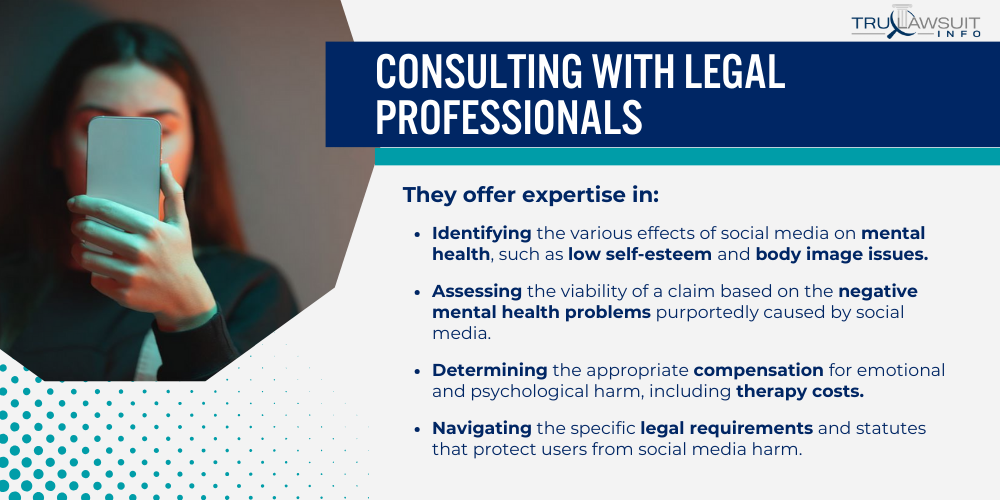
These professionals can provide vital assistance in addressing the nuances of claims related to emotional distress, mental health impacts, and associated medical treatment costs.
Seeking Guidance from Experienced Social Media Harm Attorneys
Experienced social media harm attorneys are integral in guiding individuals through the legal process.
They offer expertise in:
- Identifying the various effects of social media on mental health, such as low self-esteem and body image issues.
- Assessing the viability of a claim based on the negative mental health problems purportedly caused by social media.
- Determining the appropriate compensation for emotional and psychological harm, including therapy costs.
- Navigating the specific legal requirements and statutes that protect users from social media harm.
It’s important to seek attorneys who specialize in this area, as they will be more equipped to understand the sensitive nature of the claims and the evidence required to support them.
Protecting Your Rights and Ensuring Timely Legal Action
To safeguard your rights effectively and ensure you do not miss the opportunity to seek justice, it is critical to understand and act within the legal timelines provided by the statute of limitations.
Proactively documenting and linking the harm experienced to social media activities further strengthens your position in court.
Taking timely legal action is essential in social media harm cases, and it involves:
- Understand the statute of limitations and ensure claims are filed within this period.
- Gathering comprehensive documentation of the harm suffered and its link to social media usage.
- Ensuring all relevant legal procedures are correctly followed to avoid unnecessary delays.
- Protecting the rights of the individual throughout the legal process.
This underscores the importance of promptly consulting with legal professionals, who play a pivotal role in effectively managing the legal process and protecting the claimant’s rights.
Balancing Swift Legal Action with Thorough Case Preparation
In legal actions involving harm from social media, timing is essential, yet one must ensure the case is also built on a solid foundation of evidence.
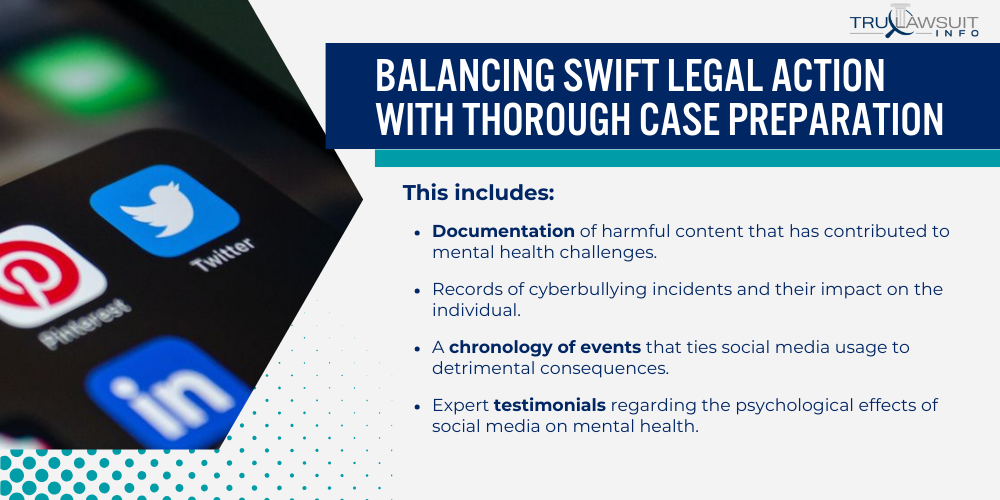
Gathering Evidence and Building a Strong Social Media Harm Case
To establish a compelling case, individuals must methodically collect proof demonstrating the harm caused by third-party content on social media apps.
This includes:
- Documentation of harmful content that has contributed to mental health challenges.
- Records of cyberbully incidents and their impact on the individual.
- A chronology of events that ties social media usage to detrimental consequences.
- Expert testimonials regarding the psychological effects of social media on mental health.
Gathering evidence is an iterative process that requires patience and attention to detail to ensure that every aspect of how a social media company has affected the claimant is captured and can withstand legal scrutiny.
Filing Within the Limitation Period to Preserve Legal Rights
Attorneys must file claims within statutory deadlines to ensure victims’ rights are preserved.
The following steps are crucial:
- Identification of applicable deadlines for filing a lawsuit related to social media harm.
- Promptly seeking legal counsel to avoid missing important legal time frames.
- Continuous update of case progress to the claimant to keep them informed.
- Ensuring all documentation is organized and ready for submission within the limitation period.
Filing promptly means one can secure a place in the legal system and prevent any rights from being forfeited due to technicalities or overlooked timelines.
Advocating for Victims' Rights
In recent lawsuits, awareness and legal actions have become essential in addressing the damages caused by social media platforms.
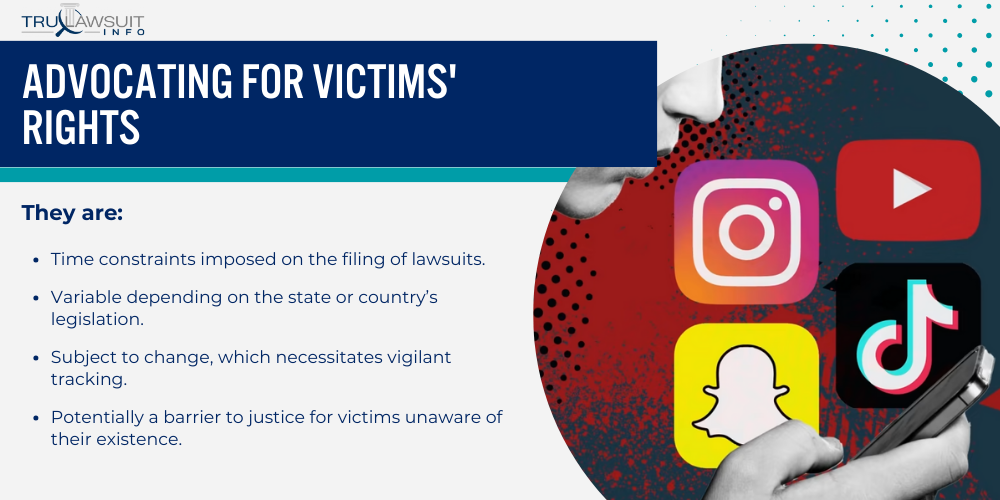
Raising Awareness of Statute of Limitations Issues
Statutes of limitations play a pivotal role in legal proceedings.
They are:
- Time constraints imposed on the filing of lawsuits.
- Variable depending on the state or country’s legislation.
- Subject to change, which necessitates vigilant tracking.
- Potentially a barrier to justice for victims unaware of their existence.
Educating the public about these time limitations is essential, particularly as they relate to social media harm lawsuits involving entities like Meta Platforms.
These time-sensitive constraints can impede a victim’s pursuit of justice, especially if they are not aware or do not understand how the statute applies to their situation.
Encouraging Prompt Reporting and Legal Action for Social Media Harms
Taking immediate steps towards reporting and legal action is vital.
Actions should include:
- Identifying social media channels that may have contributed to a person’s harm and gathering relevant evidence.
- Understanding rights under the Communications Decency Act which often protects technology companies but still has exceptions.
- Recognizing the addictive nature of social media that can affect a person’s well-being.
- Obtaining legal guidance to navigate potential claims against platforms that may perpetuate unrealistic beauty standards or allow harmful content from third-party users.
Third-party user interactions and the constant evolution of social media channels demand timely action.
Pew Research Center studies indicate that the impact of social media on well-being is complex and multifaceted.
These findings emphasize the need for timely pursuit of legal remedies.
TruLawsuit Info: #1 Social Media Lawyers
TruLawsuit represents a legal firm specializing in holding social media platforms accountable for the negative consequences on users’ mental health.
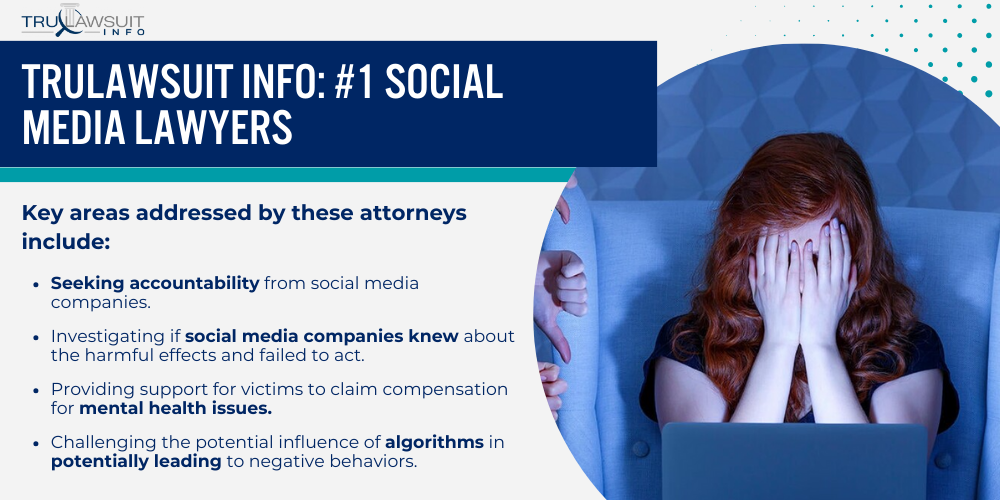
The attorneys here focus on cases where popular social media platforms may have contributed to serious mental health issues, such as eating disorders, due to the promotion of harmful content and social comparison.
Social media attorneys are crucial allies for those facing online abuse and psychological distress potentially caused by social media use.
These legal experts scrutinize the role of social media algorithms and how they might cater to vulnerable users, sometimes exacerbating their conditions.
Lawsuits allege that some social media giants were aware that their platforms could cause harm but did not take sufficient steps to prevent it.
As a result, those affected may incur medical expenses and emotional trauma, for which they seek compensation.
Key areas addressed by these attorneys include:
- Seeking accountability from social media companies.
- Investigating if social media companies knew about the harmful effects and failed to act.
- Providing support for victims to claim compensation for mental health issues.
- Challenging the potential influence of algorithms in potentially leading to negative behaviors.
In the pursuit of justice, TruLawsuit aims to provide closure and support to affected individuals and families.
The firm believes in a user’s right to a safe online experience, free from harmful content and exploitation by large tech corporations.
Frequently Asked Questions
-
Grounds for a social media harm lawsuit typically involve instances where use of a social media platform has led to measurable harm.
This can range from exposure to harmful content to experiencing harassment or cyberbullying, with implications for the user’s mental health and well-being.
-
Recent lawsuits have influenced Internet jurisprudence by challenging how laws like Section 230 of the Communications Decency Act apply to social media companies.
They have also reevaluated the balance between protecting platforms and holding them accountable for user harm.
-
Social media platforms may be held liable for mental health damages if they fail to enforce policies that protect users from known harm.
These damages may include financial losses for medical treatment and therapy related to social media-induced conditions.
-
Individuals may be eligible to join a class action lawsuit if they have experienced comparable harm as a part of a larger affected group.
Eligibility often depends on the specifics of the case and the judicial determination of class status.
-
Legal precedents include cases where courts have decided that social media companies may be responsible when they have played a role in amplifying defamatory content or have allowed harassment to occur on their platforms despite having the means to prevent it.
-
Educational institutions may approach social media-related incidents by implementing comprehensive internet safety policies and working with legal counsel to respond to incidents that affect the well-being of their students.
Coordination with law enforcement may also be necessary in severe cases.

Attorney Jessie Paluch, founder of TruLawsuit Info, has over 25 years of experience as a personal injury and mass tort attorney, and previously worked as an international tax attorney at Deloitte. Jessie collaborates with attorneys nationwide — enabling her to share reliable, up-to-date legal information with our readers.
Legally Reviewed
This article has been written and reviewed for legal accuracy and clarity by the team of writers and legal experts at TruLawsuit Info and is as accurate as possible. This content should not be taken as legal advice from an attorney. If you would like to learn more about our owner and experienced injury lawyer, Jessie Paluch, you can do so here.
Fact-Checked
TruLawsuit Info does everything possible to make sure the information in this article is up to date and accurate. If you need specific legal advice about your case, contact our team by using the chat on the bottom of this page. This article should not be taken as advice from an attorney.
You can learn more about the Social Media Harm Lawsuit by visiting any of our pages listed below:
Here, at Tru Lawsuit Info, we’re committed to helping victims get the justice they deserve.
To do this, we actively work to connect them with attorneys who are experts in litigating cases similar to theirs.
Table of Contents
Tru Lawsuit Info is a reliable source of information about issues that may affect your health and safety, such as faulty products, data breaches, and environmental hazards.
Our team of experienced writers collaborates with medical professionals, lawyers, and advocates to produce informative articles, guides, and other resources that raise awareness of these topics.
Our thorough research provides consumers with access to reliable information and updates on lawsuits happening around the country. We also can connect consumers with attorneys if they need assistance.
Here, at Tru Lawsuit Info, we’re committed to helping victims get the justice they deserve.
To do this, we actively work to connect them with attorneys who are experts in litigating cases similar to theirs.
